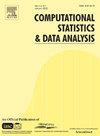Exact statistical analysis for response-adaptive clinical trials: A general and computationally tractable approach
IF 1.5
3区 数学
Q3 COMPUTER SCIENCE, INTERDISCIPLINARY APPLICATIONS
引用次数: 0
Abstract
Response-adaptive clinical trial designs allow targeting a given objective by skewing the allocation of participants to treatments based on observed outcomes. Response-adaptive designs face greater regulatory scrutiny due to potential type I error rate inflation, which limits their uptake in practice. Existing approaches for type I error control either only work for specific designs, have a risk of Monte Carlo/approximation error, are conservative, or computationally intractable. To this end, a general and computationally tractable approach is developed for exact analysis in two-arm response-adaptive designs with binary outcomes. This approach can construct exact tests for designs using either a randomized or deterministic response-adaptive procedure. The constructed conditional and unconditional exact tests generalize Fisher's and Barnard's exact tests, respectively. Furthermore, the approach allows for complexities such as delayed outcomes, early stopping, or allocation of participants in blocks. The efficient implementation of forward recursion allows for testing of two-arm trials with 1,000 participants on a standard computer. Through an illustrative computational study of trials using randomized dynamic programming it is shown that, contrary to what is known for equal allocation, the conditional exact Wald test based on total successes has, almost uniformly, higher power than the unconditional exact Wald test. Two real-world trials with the above-mentioned complexities are re-analyzed to demonstrate the value of the new approach in controlling type I errors and/or improving the statistical power.
反应适应性临床试验的精确统计分析:一种通用的、可计算的方法
反应适应性临床试验设计允许通过根据观察到的结果扭曲参与者的治疗分配来针对给定的目标。由于潜在的I型错误率膨胀,响应自适应设计面临更严格的监管审查,这限制了它们在实践中的应用。现有的I类误差控制方法要么只适用于特定的设计,要么有蒙特卡罗/近似误差的风险,要么是保守的,要么是计算上难以处理的。为此,在具有二元结果的双臂响应自适应设计中,开发了一种通用且计算易于处理的方法来进行精确分析。这种方法可以使用随机或确定性响应-自适应程序为设计构建精确的测试。构造的条件和无条件精确检验分别推广了Fisher和Barnard的精确检验。此外,该方法允许诸如延迟结果、提前停止或在块中分配参与者等复杂性。前向递归的有效实现允许在标准计算机上测试1,000名参与者的双臂试验。通过使用随机动态规划的试验的说明性计算研究表明,与已知的平均分配相反,基于总成功的条件精确沃尔德检验几乎一致地比无条件精确沃尔德检验具有更高的功率。重新分析了具有上述复杂性的两个现实世界试验,以证明新方法在控制I型误差和/或提高统计能力方面的价值。
本文章由计算机程序翻译,如有差异,请以英文原文为准。
求助全文
约1分钟内获得全文
求助全文
来源期刊

Computational Statistics & Data Analysis
数学-计算机:跨学科应用
CiteScore
3.70
自引率
5.60%
发文量
167
审稿时长
60 days
期刊介绍:
Computational Statistics and Data Analysis (CSDA), an Official Publication of the network Computational and Methodological Statistics (CMStatistics) and of the International Association for Statistical Computing (IASC), is an international journal dedicated to the dissemination of methodological research and applications in the areas of computational statistics and data analysis. The journal consists of four refereed sections which are divided into the following subject areas:
I) Computational Statistics - Manuscripts dealing with: 1) the explicit impact of computers on statistical methodology (e.g., Bayesian computing, bioinformatics,computer graphics, computer intensive inferential methods, data exploration, data mining, expert systems, heuristics, knowledge based systems, machine learning, neural networks, numerical and optimization methods, parallel computing, statistical databases, statistical systems), and 2) the development, evaluation and validation of statistical software and algorithms. Software and algorithms can be submitted with manuscripts and will be stored together with the online article.
II) Statistical Methodology for Data Analysis - Manuscripts dealing with novel and original data analytical strategies and methodologies applied in biostatistics (design and analytic methods for clinical trials, epidemiological studies, statistical genetics, or genetic/environmental interactions), chemometrics, classification, data exploration, density estimation, design of experiments, environmetrics, education, image analysis, marketing, model free data exploration, pattern recognition, psychometrics, statistical physics, image processing, robust procedures.
[...]
III) Special Applications - [...]
IV) Annals of Statistical Data Science [...]
 求助内容:
求助内容: 应助结果提醒方式:
应助结果提醒方式:


